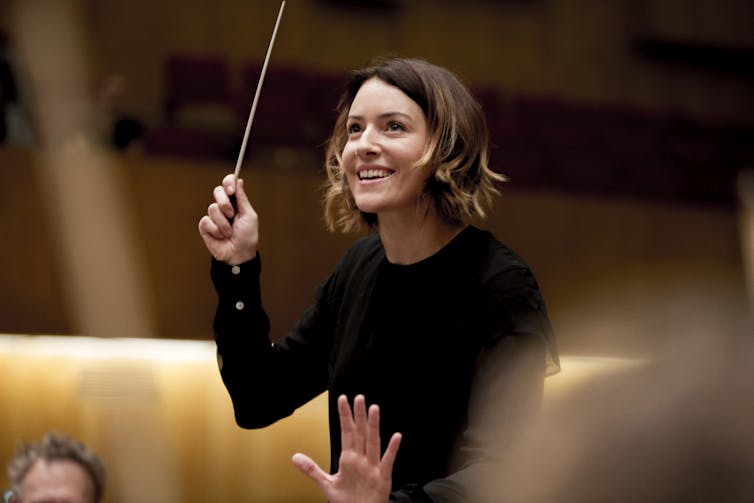With Why haven’t there been great women artists? In the 1970s, Linda Nochlin paved the way for feminist-oriented art criticism. In this text she stated, bluntly, that for many centuries it was “institutionally impossible for women to achieve excellence or artistic success on the same level as men.”
Nochlin posed that the question “have there not been women with innate talent?” should be replaced by “what is necessary for a genius to develop his potential?” Only by raising this second question can we address the first. And for this we can remember Nannerl Mozart, sister of Wolfgang Amadeus.
Google Art Project
From Mozart to Mendelssohn
Nannerl was a child prodigy and, as such, visited different European courts with her brother, being as acclaimed as him, if not more so. But, unlike Wolfgang Amadeus, Ella Nannerl had to give up music when she reached the age of looking for a husband. Her talent was well known to her brother: so much so that today we know that he turned to her on numerous occasions to review some of the concertos he composed.
Nor could Fanny Mendelssohn fully develop her talent. Her father’s refusal to dedicate herself to music was recorded in different letters, such as the one he wrote to her when she was 15 years old: “Music will perhaps be Felix’s profession, but for you it can or should only be a ornament. “It should not and cannot be the foundation of your existence and daily life.” Like Wolfgang, Felix was well aware of his sister’s talent. But, in addition, he took advantage of this by publishing works composed by Fanny as his own.
Thus, we can ask ourselves: what would have happened to Fanny and Nannerl if the circumstances were different? What if they had been able to fully develop their musical talent?
The circumstances of artists in the past
But it was impossible for them to do it. Women who have wanted to dedicate themselves to music have been affected, with different intensity depending on the time, by social pressures, mainly related to the need to get married, and consequently to have children and give up their aspirations. . Or the impossibility, due to the social rejection it would cause, of being able to publish works under her own name.
They have also had to face very different types of impediments, such as being limited exclusively to the private sphere, or a public one with many restrictions. It was also impossible for them to take composition classes in some conservatories because this was considered an intellectual activity reserved for men.

IMSLP, CC BY-SA
As if all this were not enough, women who wanted to dedicate themselves to musical activity had to master those internal demons that are doubt and the feeling of guilt, face the condescending attitude of their male colleagues and always face the fear of failure. and to ridicule.
These fears were very present in a contemporary of Fanny Mendelssohn, Clara Wick (Schumann, after marrying). Clara had to face the strong social pressures of the 19th century and the feeling of vertigo that must come from thinking that you are the first person to do something. This is what musicologist Marcía Citron later called “authorship anxiety” and which Clara recorded in her diary with these words:
“A woman should not want to compose, there has never been one capable of doing so. And do I want to be the only one? It would be arrogant to believe it.”
The situation since the 20th century
All this seems very far away in time and we think that it no longer happens in our modern societies. But has equal rights really meant equal opportunities for women in the field of music?
Here we must mention the machismo of many orchestras and conductors. Acclaimed conductor Zubin Mehta stated in 1970: “I believe that women should not be in an orchestra. They become masculine. The men treat them as equals (…) A beautiful woman would distract the other musicians and an ugly one would distract me.”
Until 1997, the Vienna Philharmonic Orchestra, which offers those magnificent New Year’s concerts, only admitted male (and white-skinned) instrumentalists to its official roster (although harpist Anna Lelkes, the first woman admitted as a member, had been playing with the orchestra since 1974).

Alondradelaparra.com
Choosing musicians blindly
To try to alleviate this inequality of opportunities, “blind auditions” were devised in the selection of instrumentalists in orchestras. The Boston Symphony was a pioneer. In 1952 he began to carry out candidate selection tests with them behind a screen and also barefoot, so that their footwear could not be aurally discriminated when walking across the stage.
Curiously, with this procedure the proportion of women selected began to increase markedly: the New York Philharmonic reached 35% in 1997, after decades with hardly any women among its ranks.
Unfortunately, this fortunate measure was not without its detractors, such as the Vienna Philharmonic Orchestra, which remained faithful to its style for a few more years. With this background, it should not be surprising that the famous orchestra, created in 1842, was not officially under the direction of a woman, the Australian Simone Young, until 2005. Previously, Anne Manson had conducted it at the Salzburg Festival in 1994, replacing Claudio Abbado. But the prohibition on hiring women (established in the statutes) was still operative.
These are some examples that illustrate centuries of inequalities and that make us have to rethink the starting question again and ask it, now, in this other way: how, considering the obstacles, have there been so many women who have managed to shine in music?
